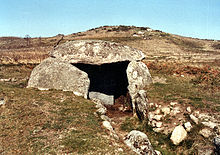- For other places with the same name, see Baião (disambiguation).
Baião is a town in Douro Litoral, Portugal.
Understand
edit
Baião (/baj.ˈɐ̃w/, bigh-UHNGOO) is the municipality with the highest percentage of green area and forest in the entire district of Porto (63.5 percent of the territory) and has in its territory natural resources of rare beauty, such as Serra da Aboboreira, Serra do Marão, the Serra do Castelo de Matos or the Douro, Teixeira and Ovil rivers.
Visitor information
edit- 1 Visit Baião (Interactive Tourism Store), Rua de Camões, Jardim Dr. José Teixeira da Silva, ☏ +351 255 006 348, tourism@cm-baiao.pt. M–F 09:00–12:30 & 13:30–17:00, Sa Su 10:00–13:00.
Get in
editThe nearest motorways are A4 (Autoestrada Transmontana or Autoestrada de Trás-os-Montes e Alto Douro) and A24 (Autoestrada do Interior Norte).
Get around
editSee
edit- 1 Igreja de São Tiago de Valadares, Alameda de São Tiago.

- 2 Mosteiro de Santo André de Ancede, Rua Padre Lima, Ancede. Founded in 1113 AD, prior to the foundation of Portuguese nationality. Its social and economic influence during the medieval period was felt in an extension that went from Porto to Régua.

- The megalithic ensemble composed of the Aboboreira and Castelo de Matos Mountains, where the Serra da Aboboreira Archaeological Field (CASA) has more found than five thousand years of uninterrupted settlement.
- There are some fauna species unique in the entire Iberian Peninsula. The county preserves between 30 and 40 percent of some animal and plant species existing throughout the Portuguese territory.
- Tapir of Aboboreira (also known as Tapir de Chã de Parada, Dolmen of Fonte do Mel, Casa da Moura de S. João de Ovil, Casa dos Mouros and Cova do Lólio), in the Serra da Aboboreira in the parish of Ovil. It is classified as National Monument and built during the first half of the 3rd millennium BC, this prehistoric funerary monument is part of a set of four other specimens belonging to the Megalithic Necropolis of Serra da Aboboreira.
Do
editBaião is famous for the quality of its meat, in particular, the smokehouse and the lamb roast and its wines. The City Council promotes two gastronomic initiatives annually. Visited by thousands of people from different parts of the country, the first, called Feira do Fumeiro e do Cozido à Portuguesa, takes place in March or early April and the second, known as Festival do Anho Assado e do Arroz do Forno, at the end of July. Parallel to these initiatives, there is an exhibition of wines and handicrafts, with special emphasis on basketry and the famous Gestaçô canes , traditional sweets, with emphasis on Biscoito da Teixeira, and traditional music from the region.
Buy
editEat
edit- 1 Pensão Borges, Rua de Camões, 306, ☏ +351 255 541 322, reservas@residencialborges.com. Also provides lodging.
- 2 Restaurante Tasca do Dino, Rua de Camões, ☏ +351 919 445 826. Also provides lodging.
Drink
editSleep
edit- 1 Casa da Lavand’eira, Rua da Lavandeira - Penalva de Baixo, 4640-024 Ancede, ☏ +351 255 551 008, info@casadalavandeira.com. Check-in: 15:00 - 21:00, check-out: Until 12:00. Agriturism.
- 2 Douro Palace Hotel Resort & Spa, ☏ +351 254 880 000, reservas@douropalace.com. Check-in: From 15:00 hours, check-out: Until noon. 4-star hotel.
- 3 Douro Royal Valley Hotel & Spa, Portela do Rio Pala, 4640-400 Ribadouro, ☏ +351 255 070 900, reservas@douroroyal.com. Check-in: From 15:00, check-out: Until 12:00. 5-star hotel.

